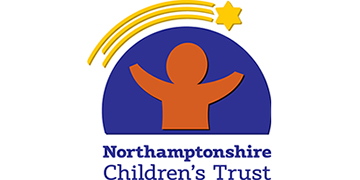“If you come here, you will feel valued, supported and part of a service and organisation that truly has no other purpose but to work for children and families in this area and wants to excel at doing that.”
This is Samantha Lurock summing up her experience of six months working in Northamptonshire children’s services, initially for the county council and, since November 2020, at Northamptonshire Children’s Trust, where she manages one of the duty and assessment teams.
The trust is responsible for children’s social care, early help and youth offending services in the county, working in partnership with and under the ownership of Northamptonshire County Council. From 1 April 2021, two unitary authorities, West Northamptonshire and North Northamptonshire, take over responsibility for local government in the county, and will have joint ownership of the trust.
The changes are the result of government intervention to tackle significant challenges in the county over the past few years, during which children’s services have faced unstable leadership, high workloads for staff and a series of negative inspection reports from Ofsted.
However, as shown by a report out today from the inspectorate on services for children in care, things are changing in Northamptonshire, with improvements in the quality of services under a more stable workforce experiencing reducing caseloads.
Sitting behind this, inspectors found, was a stable senior leadership that was “ambitious, child focused and committed to improving the lives of children in Northamptonshire”.
Being the best you can be
With almost all leaders and managers, from team manager upwards, now in permanent roles, trust chief executive, Colin Foster, says the priority is bringing in practitioners to join its “inspirational journey of improvement”, with the promise that they will be “given the tools to be the best they can be”.
This support comes in a number of forms, starting with training and development.
“You get some amazing training,” says Stacey Francis, a social worker in one of the trust’s children’s support and safeguarding teams. “Team managers will constantly send you training updates and encourage you to book on, and we cover each other when we’re training. I had five days’ training in a month recently, but it didn’t affect anything on my caseload because colleagues did visits for me, and someone attended a conference for me.”
Samantha agrees the training offer is “impressive”, while both also point to the positive impact on practice of Northamptonshire’s implementation of the Signs of Safety practice model, which encourages staff to work collaboratively with families and draw up safety plans focused on their strengths, networks and resources.
“I love it,” says Stacey. “It really empowers families and gets them to take ownership of what the worries are and what’s working well. It’s a lovely way of working with families. From day one you’re offered lots of bite-sized training on it.”
The investment in staff knowledge and skills is matched by a support for progression, says Stacey, who joined Northamptonshire to do her assessed and supported year in employment in 2019.
“The trust really advocates for staff to progress. We’ve recently had a family support worker who was supported to apply for a social work apprenticeship, a social worker who has gone up to be a senior and another who became an advanced practitioner and is now team manager.”
Fast-falling caseloads
While previous Ofsted reports have highlighted very high caseloads as a significant problem in Northamptonshire, these have been reducing fast.
When the trust started work in November, caseloads in its duty and assessment teams were in the high 20s. They now average 17, with 19 the average across the trust.
“We are seeing a decrease in caseloads across all teams,” says Colin. “That has meant social workers have more time for direct work with children, therefore we are seeking significant improvement in outcomes for children.”
A supportive culture
Beneath the caseload figures sits a culture of support that permeates the trust’s teams.
“I feel really lucky to be part of such a great team,” says Stacey. “I recently had some time off unwell and I know that lots of social workers’ dread coming back to lots of work to catch up on. I didn’t come back to that. All of the work that needed my attention had been done.”
Lesley Cooke, a social worker in the fostering recruitment, training and assessment team, feels similarly in relation to her team.
“I feel very supported. If I have an issue I know I can speak to my managers if anything was bothering me. I feel they’ve got my back.”
She says this has particularly come through during the pandemic, with staff working remotely without the usual face-to-face oversight from managers.
“I feel there’s real trust,” says Lesley. “There’s no checking up on you. They know you’ll do the job.”
Visible leadership without hierarchy
Underpinning this support is the stable, ambitious and committed leadership found by Ofsted.
Colin joined Northamptonshire following 11 years working in Bedford, most recently as director of children’s services. So why make the move?
“It felt like a real calling,” he says. “I had seen the changes [in Northamptonshire] from afar and the press coverage and I thought, ‘I can’t not try’. I live locally and wanted to come and make a difference to a community on my doorstep.”
His approach is one of high visibility and little hierarchy, embodied by his regular “58Minutes” briefings with staff, which Colin aims to delivers in under 60 minutes because he doesn’t want to take up more than an hour of people’s precious time.
“I am not one of those leaders who insist that everyone comes to one place at one time because that fits around my diary,” he says. “My deal is that I will do as many sessions as required but that each person attends one.”
The approach filters through to the rest of the senior management team, and is appreciated by staff.
Rob Fuller, practice manager in the fostering recruitment, training and assessment team, says: “Previously we’ve had people who have done to us because that’s their version of improvement. Now senior leaders are aware of what we do and how we need to improve, and are much more about supporting rather than telling.”
A positive recruitment experience
That culture extends beyond the trust’s workforce to those who are considering coming to work for the organisation.
If you apply for a role at the trust with a CV, you are guaranteed an interview within 14 days, all interviews taking place on a Thursday. If successful, you’ll be offered a job the next day and enabled to start as soon as possible. Colin calls everyone who applies to thank them for doing so.
“If you have worked here before or have left recently, please give us a chance as things are changing,” he says. “If you’ve never worked in Northamptonshire come and give it a go because we are on an inspirational journey of improvement and you could play a key part of this.”
If you are interested in a role at Northamptonshire Children’s Trust, check out the latest vacancies here.




 Facebook
Facebook X
X LinkedIn
LinkedIn Instagram
Instagram